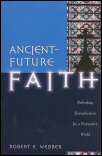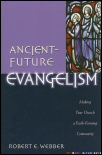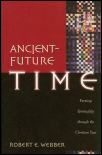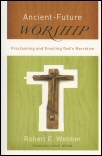Robert Webber Ancient-Future Collection (4 vols.)
Digital Logos Edition
Overview
How do you deliver the authentic faith and great wisdom of the past into the new cultural situation of the twenty-first century? The way into the future is not an innovative new start for the church; rather, the road to the future runs through the past.
Each book in the 4-volume Robert Webber Ancient-Future Collection presents an issue related to faith and practice from a particular point of view—namely, that of drawing wisdom from the past and translating insights from historic Christianity into the present and future life of the church, its faith, worship, ministry, and spirituality. These books speak to the longing to discover the roots of the faith in the biblical and classical tradition of the church.
Webber’s goal is maintain continuity with historic Christianity as the church moves forward. In each volume, Webber draws from the entire history of the church together—Orthodox, Catholic, and Protestant—and from Reformers and evangelicals, such as John Wesley and Jonathan Edwards. Webber weaves insights from these traditions with the challenges of the present in order to help readers understand how deeply committed Christians have sought to think and live the faith in other times and places.
Students, professors, pastors, and laypeople concerned with the church's effective response to a postmodern world will benefit from these volumes. Informative tables and extensive bibliographies enhance each book's educational value.
Looking for more works by Robert Webber? Check out The Complete Library of Christian Worship (7 vols.) and the Robert Webber Collection (2 vols.).

- Numerous tables and charts to guide your reading
- An extensive bibliography in each volume
- Topical index for quick reference
- Title: Robert Webber Ancient-Future Collection
- Author: Robert Webber
- Publisher: Baker
- Volumes: 4
- Pages: 864

In a world marked by relativism, individualism, pluralism, and the transition from a modern to a postmodern worldview, evangelical Christians must find ways to re-present the historic faith.
In his provocative work, Ancient-Future Faith, Robert E. Webber contends that present-day evangelicalism is a product of modernity. Allegiance to modernity, he argues, must be relinquished to free evangelicals to become more consistently historic. Empowerment to function in our changing culture will be found by adapting the classical tradition to our postmodern time. Webber demonstrates the implications in the key areas of church, worship, spirituality, evangelism, nurture, and mission.
Webber writes, "The fundamental concern of Ancient-Future Faith is to find points of contact between classical Christianity and postmodern thought. Classical Christianity was shaped in a pagan and relativistic society much like our own. Classical Christianity was not an accommodation to paganism but an alternative practice of life. Christians in a postmodern world will succeed, not by watering down the faith, but by being a counter cultural community that invites people to be shaped by the story of Israel and Jesus."
A substantial appendix explores the development of authority in the early church, an important issue for evangelicals in a society that shares many features with the Roman world of early Christians.
The Agenda for Theology, which I attempted to set forth in 1979, is here being significantly extended by Robert Webber in 1999 in a way that is profoundly gratifying
—Thomas C. Oden, professor of theology, Drew University
With his customary lucidity and catholicity, but in a way that cuts deeper than his earlier writings, Robert Webber substantiates the vision of an anciently-rooted and forward-looking evangelicalism that marks all of his work. Ancient-Future Faith works as a narrative-oriented Christian primer and as a road map to the promise of catholic evangelicalism. For the theologically inclined, it also works as a Gadamerian exercise in the fusion of theological horizons, showing how the Christus Victor Christocentrism of ancient Christianity might reshape the faith that Christians live and claim in a postmodern context. Webber shows what it means to take seriously the character of Christian testimony as Christ-following church-formed story.
—Gary Dorrien, author, The Remaking of Evangelical Theology
Here is a faith for our time that finds in the ancient traditions the power to speak to the postmodern world. This book amounts to an introduction to Christianity from the theme of Christus Victor. It draws from Webber’s own experience of growth as a hearer of God’s Word and is backed up with an impressive set of endnotes, charts, and bibliography.
—Clark H. Pinnock, professor of theology, McMaster Divinity College
This book makes an important contribution…as a call for theological renewal within evangelical churches. Webber provides a wealth of suggestions to help churches appropriate the heritage of 'classical Christianity' for use in contemporary settings…Webber correctly anticipates the inevitable questions about authority, Scripture, and tradition that his proposals will raise for evangelicals…Timely, practical, and persuasive.
—Publishers Weekly
With an obvious love for the writings of the church fathers, Webber weaves the ideals of classical Christianity with postmodern thought. The radical, countercultural faith of the early church is relevant to our faith.
—Leadership Journal
This book is a must for those in the ministry and those who anticipate a lifetime of ministry.
—Ronald B. Mayers, Reformed Review

How can evangelism produce not only converts but also disciples who grow in faith and become active members of the church?
In Ancient-Future Evangelism, Robert Webber presents a model of evangelism and discipleship firmly rooted in Scripture, attested to in the history of the church, and authentic to the postmodern world in which we live.
Webber surveys evangelism throughout the centuries, tracing the development of the ancient process of Christian formation. He translates that process for the twenty-first century, presenting four stages—conversion, discipleship, spiritual formation, and Christian vocation—that can easily be adapted to various church traditions. He also suggests three practical rites of passage to accompany this “ancient-future” practice of making disciples.
Webber then underscores how the four-fold process of faith formation is interwoven with three theological themes: Christ as victor over evil, the church as witness to God’s salvation, and worship as a witness to God’s mission accomplished in Jesus.
A simplistic and reductionist understanding of salvation has led to an obsession with conversion to the detriment of discipleship. Dr. Robert Webber provides a helpful framework to all who desire a deeper perspective on this significant subject. Every Christian disturbed by the lack of depth in the church should read Ancient-Future Evangelism.
—Dr. Appianda Arthur, president, Global Leaders Initiative, Colorado Springs
Hoping to eliminate the distance between salvation and discipleship on the roadmap of faith, recognized worship evangelism expert Robert Webber digs into postmodern thought, as well as church history, to pave a path of evangelism that does not ignore the Great Commission's 'make disciples' command and champions spiritual conversion as a start, not an end.
—Tamara Rice, Outreach

Discover ancient rhythms for a new spiritual awakening!
God's people have always celebrated his work by retelling the stories of his mighty deeds of salvation. In a time when the church's memory sometimes seems short, many are rediscovering the value of using the Christian year to pattern our celebrations around the essential truths of the faith.
In Ancient-Future Time, Robert Webber draws from this church tradition by introducing and exploring biblical themes and liturgical traditions for each season of the Christian calendar. Helpful charts, prayers, reflection questions, and resource lists are provided for those planning church worship or seeking old, yet new, paths to spiritual growth through a deeper understanding of the Christian year.
The rhythm of Christian-year spirituality is part of the heritage of liturgical wisdom that Robert Webber has long been relaying to evangelicals enthusiastically and with flair. The layout of it here is the spiritual equivalent of a combined course of antibiotics and vitamins; both pastors and people who take the course will benefit greatly.
—J. I. Packer, professor of theology, Regent College
In an age that says, 'time is money,' Robert Webber says, 'time is spirituality.' Webber reminds us of the many old truths about the Christian year, which if followed, can become a countercultural witness and a very practical means of drawing closer to Jesus Christ.
—Mark Galli, managing editor, Christianity Today

There is a crisis of worship today. The problem goes beyond matters of style—it is a crisis of content and of form. Worship in churches today is too often dead and dry, or busy and self-involved. Robert Webber attributes these problems to a loss of vision of God and of God's narrative in past, present, and future history. As he examines worship practices of Old Testament Israel and the early church, Webber uncovers ancient principles and practices that can reinvigorate our worship today and into the future.
The final volume in Webber's acclaimed Ancient-Future series, Ancient-Future Worship is the culmination of a lifetime of study and reflection on Christian worship. Here is an urgent call to recover a vigorous, God-glorifying, transformative worship through the enactment and proclamation of God's glorious story. The road to the future, argues Webber, runs through the past.
[Robert Webber has] introduced so many of us to the early church as a period of unique theological insight, spiritual vitality, and prophetic correction. [He does so] in a way that energizes practicing pastors and lay Christians. It was said of Princeton’s Peter Brown, ‘He rescued the past from the tyranny of stereotypes.’ That is also true for Robert Webber, especially when it comes to worship
—John D. Witvliet, director, Calvin Institute of Christian Worship and professor of worship, Calvin Theological Seminary
Robert E. Webber was, at the time of his death, Myers Professor of Ministry at Northern Seminary in Lombard, Illinois, and served as the president of the Institute for Worship Studies in Orange Park, Florida. Over 30,000 people have attended his workshops, and he has authored over forty books on worship and the church, including the Complete Library of Christian Worship, available from Logos. He has also written Renew Your Worship and developed a complete audio and video series based on the book and its related workshops. Prior to his appointment at Northern Seminary, Webber taught at Wheaton College for thirty-two years as professor of theology. He has taught courses on the history, theology, and practice of worship and spirituality.
Reviews
9 ratings

Ralph A. Abernethy III
9/7/2017

Richard Villarreal
8/6/2017

Scott J Sherwood
5/23/2016

Stephen Williams
1/24/2016

Todd Allen Bellemey
10/30/2014

Allen Bingham
9/5/2014

Bill Shewmaker
10/19/2013
Dr. Jeff Trostle
8/9/2013

RevSarge
8/5/2013